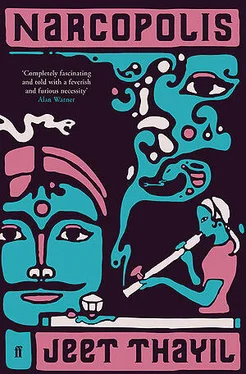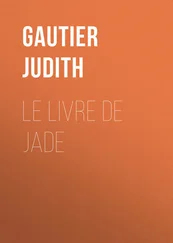Jeet Thayil - Narcopolis
Здесь есть возможность читать онлайн «Jeet Thayil - Narcopolis» весь текст электронной книги совершенно бесплатно (целиком полную версию без сокращений). В некоторых случаях можно слушать аудио, скачать через торрент в формате fb2 и присутствует краткое содержание. Год выпуска: 2012, Издательство: Faber & Faber, Жанр: Современная проза, на итальянском языке. Описание произведения, (предисловие) а так же отзывы посетителей доступны на портале библиотеки ЛибКат.
- Название:Narcopolis
- Автор:
- Издательство:Faber & Faber
- Жанр:
- Год:2012
- ISBN:нет данных
- Рейтинг книги:3 / 5. Голосов: 1
-
Избранное:Добавить в избранное
- Отзывы:
-
Ваша оценка:
- 60
- 1
- 2
- 3
- 4
- 5
Narcopolis: краткое содержание, описание и аннотация
Предлагаем к чтению аннотацию, описание, краткое содержание или предисловие (зависит от того, что написал сам автор книги «Narcopolis»). Если вы не нашли необходимую информацию о книге — напишите в комментариях, мы постараемся отыскать её.
Outside, stray dogs lope in packs. Street vendors hustle. Hookers call for custom through the bars of their cages as their pimps slouch in doorways in the half-light. There is an underworld whisper of a new terror: the Pathar Maar, the stone killer, whose victims are the nameless, invisible poor. There are too many of them to count in this broken city.
Narcopolis
Narcopolis — читать онлайн бесплатно полную книгу (весь текст) целиком
Ниже представлен текст книги, разбитый по страницам. Система сохранения места последней прочитанной страницы, позволяет с удобством читать онлайн бесплатно книгу «Narcopolis», без необходимости каждый раз заново искать на чём Вы остановились. Поставьте закладку, и сможете в любой момент перейти на страницу, на которой закончили чтение.
Интервал:
Закладка:
He said, ‘They’re killing themselves, the fuckers, let’s hope they do it right this time.’
She put the vials in her purse and left the shop. It was a short walk to the khana, but today the route seemed unfamiliar. Nothing moved on the street except for a man pushing a long cart. He was far away and at that distance all she could see was his dirty white kurta and bare feet. In the cart were long objects, sticks or swords, she couldn’t tell. She took a detour through Kamathipura IIIrd Lane. The lane was usually difficult to walk in: people put their cots on the road and spent all day lounging in the narrow shade. But the cots were gone, the randi’s cages shuttered, the shops closed. Nothing was open except a raddiwallah’s, where an old man sat behind a pair of scales and small mountains of used books and magazines. She reached out and took the first thing that came to hand, because she was reading now and had not gotten over the habit of reading at random.
SOME USES OF REINCARNATION
By S. T. Pande
Head of Department, Theology & Symmetry, Haryana University.
She recognized the author’s name and took another look at the book. It was slim and in good condition, a school textbook with illustrations. The raddiwallah gave it to her for one rupee. She walked quickly to the khana and banged on the door a few times and shouted Bengali’s name. She banged some more. She said, Come on, open, I know you’re there, the door’s locked from the inside. Go home, Bengali told her. Go home and don’t come out. She went up. As she dug in her purse for the key she had the sudden feeling that she was being watched, but when she turned around there was no one there.
*
It wasn’t vanity as much as its opposite. Why show her face if she didn’t want to be seen? She was grateful for the refuge of the burkha. It simplified things, made her day-to-day life manageable, which, she knew, was no easy thing. She put kaajal on her eyes and painted her nails and put on a pair of sandals and she was ready to go. Under the veil she could have been anyone. She took the veil off at the khana, but she worked in the burkha and Rashid made no objection. At home she spot smoked: a little powder on the foil, a match under it, a quick drag at the straw and she was done. Because they were tiny drags, she took a hit as often as she could.
One afternoon Rashid came by with a bag of fresh vegetables and a dabba of mutton masala and rotis still warm from his kitchen. There was no food in the markets. Don’t go out, the mobs have taken over, he told her. They’ve appointed themselves our executioners. Then he saw her spot smoking Chemical and he wanted to try it too. Dimple told him what had happened the first time she smoked. She told him the entire sequence of her nightmares, starting with the house of blue pools and ending with her last conversation with Mr Lee. She had a fear of water now, she said, even a puddle made her fearful. This is strong maal, it does something to your head. But the warning only made Rashid impatient. He said, If it’s as strong as you say I’ll have to pace myself. First sex, then smoke. Dimple bent over her foil and he got on his knees behind her. He saw how bony her ass had become. He used spit to wet her and he thought about the beggar woman with the haircut whose body had been found on the street, the Pathar Maar’s latest victim, according to the newspapers. Or was she a victim of the Hindu — Muslim wars? What community had she belonged to? Did she know? No one did, he thought, not even the man who killed her for sport; and he fucked Dimple as the Chemical pulled her into a nod. Rashid saw her head go down and he closed his own eyes to concentrate on his orgasm but a disembodied head floated past him on a tide of ink. When the old Chinaman swivelled around to smile, Rashid cried out a name. He pulled out of Dimple and sat on the floor, taking big gulps of air. What was the name he cried? He didn’t know. What he did remember, what he’d never forget, was the revelation that followed immediately afterwards: dreams leak.
*
They do, thought Rashid, sitting on the floor of Dimple’s living room, as the crows went quiet and the street turned red from the glow of a timber warehouse that was burning nearby. Dreams leak from head to head; they travel between those who face in the same direction, that is to say lovers, and those who share the bonds of intoxication and death. That’s why the old Chini’s head is in mine. I’m dreaming Dimple’s dream and I want to stop but I don’t know how. The beggar woman is dead and Dimple too is dead and I deserve to die for fucking the dead. He smelled the smoke from the burning warehouse as the sweat broke on his face and the room turned red. I deserve to be here in hell, he thought, as he reached down and squeezed his dick with his hand, squeezed as hard as he could, squeezed until he was shouting and he saw a vision of himself in the future, sitting in a room while the evening gathered, still dreaming her dream, except the dream was not of Mr Lee but of himself, years after Dimple’s death, when he was old and pious and waiting for her ghost, and he heard her future words, the lovely words with which she would greet him: dreams leak and the dead return, but only if you love us. Of the dozen words she would speak in the future, he’d be struck by the word love, because it had never before been uttered between them, not in all their time together. By then, Rashid would know the truth of the words, though he’d be glad to hear them from her; and by then he’d be grateful, bewildered but grateful that she’d come back to pay him this compliment.
*
She had thought about what to say, she’d prepared herself. When Mr Lee thanked her for coming back, she said, It’s nothing. How could I not come? I owe you this much. Now tell me what you were going to say the last time. He blinked at her, his impassive face flickering in the blue. She noticed tiny bubbles in the corners of his mouth. In his newly acquired accentless English he said, When my father died our lives changed for ever. My mother was sent away and I had to start working. My father lost interest in being a man. The only thing he was interested in was opium. Then he died, in that way he let us down, but I always honoured him. I attended to his rites as long as I was able. I fulfilled my duties as a son. When I became a father I was always afraid I would become like him, become a slave to opium and forget how to be a man. So I took care, I took the utmost care to fulfil my responsibilities. When I died, what did you do? Were you not my daughter? Wasn’t I a better father to you than your real father? I left you only when I had no choice. Until then I gave you my protection and shared my life and all my possessions with you. In return I asked for one thing. When you said you would do it, did you know you would not? This is the question I wanted to ask you. This is why I asked you to come back. Her reply was so soft even she could barely hear it. No, Father Lee, when I said I would do it, I meant it. You didn’t: you lied then and you’re lying now. You made a fool of a sick man. Dimple’s tears were of a slightly different colour than the water, less transparent, of a lighter blue. Old Father Lee, she said, forgive me. Please, I’m so sorry. What must I do to earn your forgiveness? And it was when she heard Mr Lee’s reply that she knew she would never be able to appease him, that he ill-wished her, that he would never forgive her and she would never forgive herself, and that grievances did not disappear with death, if anything they became more pronounced.
Mr Lee said: Smoke more Chemical
Chapter Nine The Intoxicated Entity
It was 1992, which meant that she’d been living in the apartment on the half landing between Rashid’s khana and his home for almost ten years, and though she’d come across his family on the stairs or in the neighbourhood — a cause of apparent distress to his wives, who lowered their eyes and walked on without a word — she had never been to his home and knew nothing about his family life. He rarely mentioned his wives, and if he did, it was to complain about some trivial domestic matter, as if they were employees and he was disappointed with the quality of their service. She wondered if he spoke about her in the same way, and if he spoke about her at all. His wives kept his home running, laundered his white shirts and made his food the way he wanted. She on the other hand had no official standing. She could not bear children or cook; all she could provide was sex and conversation. The sex at least he couldn’t complain about, she knew, because that had once been her job and she’d been good at it. He didn’t have complaints, but she did, though she had no one to tell them to. He had an aversion to touch, to any kind of friendly touching, and cuddling was out of the question. He didn’t like to be seen with her in public. He took too long to come. Sometimes, when they were fucking, she thought of a story she’d read in which the plague arrived to a town in Europe. You sneezed for a few days and died, just like that. As soon as people were identified as sick, they were bundled into carts and taken to the cemetery, where they were dumped, alive, to await burial. In the carts, the men and women fell on each other like animals, not stopping even when they were seized by the handlers and flung onto the cemetery grounds. It seemed to her that they, Rashid and she, fucked in the same way that the plague-stricken couples did, in a frenzy, to the death.
Читать дальшеИнтервал:
Закладка:
Похожие книги на «Narcopolis»
Представляем Вашему вниманию похожие книги на «Narcopolis» списком для выбора. Мы отобрали схожую по названию и смыслу литературу в надежде предоставить читателям больше вариантов отыскать новые, интересные, ещё непрочитанные произведения.
Обсуждение, отзывы о книге «Narcopolis» и просто собственные мнения читателей. Оставьте ваши комментарии, напишите, что Вы думаете о произведении, его смысле или главных героях. Укажите что конкретно понравилось, а что нет, и почему Вы так считаете.












